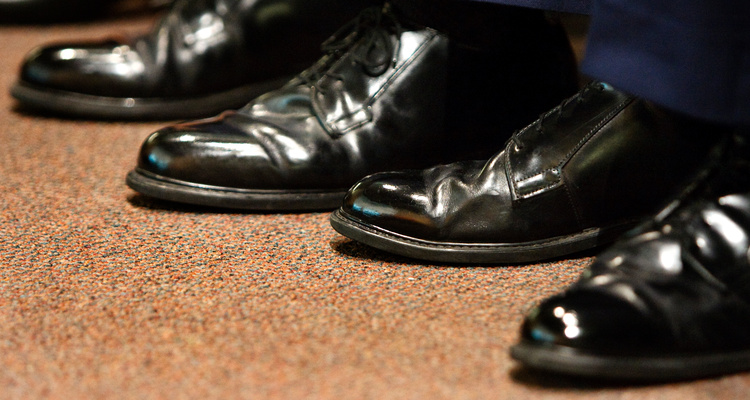"The willingness with which our young people are likely to serve in any war, no matter how justified, shall be directly proportional to how they perceive the veterans of earlier wars were treated and appreciated by their nation."
~ George Washington
Commander-in-chief, Continental Army
First President
* * *
Veterans Day
On the 11th hour of the 11th day of the 11th month of the year 1918, the warring parties of Europe signed an armistice to end “The Great War” – “The “War to End all Wars.” In November 1919, President Wilson proclaimed Nov. 11 as the first commemoration of Armistice Day (renamed Veterans Day following WW II).
Nearly 100 years later, wars continue unabated … WW II, Korea, Vietnam, the Middle East, and now the War on Terror. Though the locations and strategies of battle have changed over the years, one thing has remained constant: It’s the soldiers, sailors, airmen and Marines – America’s veterans – who have most shouldered the burdens of war.
As we honor them this Veterans Day, it’s heartwarming to know that there are those who serve the needs of America’s veterans beyond the yellow ribbons of our compassion and appreciation and beyond the Arches of St. Thomas, which has had a connection to military service since 1906 (see the video above) and home to U.S. Air Force ROTC Detachment 410 since 1948, one year after the Air Force was formed as a separate branch of the military.
Among them are Dr. Stephen Brookfield, John Ireland Chair, College of Education, Leadership and Counseling, and Jean M. Birbilis, Ph.D., L.P., B.C.B., Graduate School of Professional Psychology. Both have addressed veterans’ issues for years in various educational settings.
* * *
Dr. Stephen Brookfield
Although he didn’t grow up on military bases, Brookfield comes from a military family: His parents met while serving in the British navy in the WW II era. His mother was “very, very proud of being a ‘WREN’” (Women of the Royal Naval Services).
Brookfield was the keynote speaker at the Marine Corps University 2013 Faculty Development Conference held in July in Quantico, Va. The university is accredited to award graduate degrees to include: Master of Strategic Studies, Master of Operational Studies, and Master of Military Studies.

Dr. Stephen Brookfield
The conference’s theme was Mission Impossible: Furthering the Excellence of Marine Corps University Faculty. “They were interested in looking at creative, new ways to, particularly, develop new leaders,” Brookfield commented. Units represented in the audience of mostly officers were the Marine Corps War College, School of Advanced Warfighting, Command and Staff College, Expeditionary Warfare School, and Enlisted Professional Military Education.
Brookfield has spoken at numerous military workshops around the country. At Quantico, he spoke on “Becoming a Skillful Teacher.” He was asked to focus on the high rate of the untreated depression and sexual harassment in the military, and, he added, “How do we as instructors create opportunities in the classroom where these sorts of things that typically are not talked about become the focus of discussion around leadership, and what leadership looks like in taking the role to treat mental illness and to encourage a climate in which depression and suicidal thoughts and so on are OK to be talked about and not a sign of a basic character flaw or a dent in your machismo.”
A nice part about the day was that my father-in-law, who is almost 90 years old, who was a Marine and served in the battle of Saipan, came from Rochester, Minnesota, to the event because he really wanted to see his son-in-law speaking to the Marines. At one point he was introduced as the oldest Marine on the base, and got a fantastic round of applause.”
~ Dr. Stephen Brookfield
(His father-in-law’s name: Glenn Miller.)
He had to rearrange his schedule in order to speak at Quantico, but he was happy to do so for admittedly “selfish” reasons.
“I really find the kinds of questions and concerns typically that are raised in military settings are always personally very interesting to me because you are really dealing in many situations with life and death issues, and the toll that active service takes is enormous. The learning that’s required to come to terms with the price that you’ve paid and the cost of service – learning how to deal with that, how to disclose it, how to manage it – is incredibly complex and challenging. So any instructors who are helping personnel learn how to deal with the effects of combat and service, to me, is really an incredibly interesting thing to be involved with as an educator.”
Brookfield said he took away three things from the conference:
- A desire to do more of this kind of work with the Marine Corps.
- “A renewed appreciation for how difficult the kind of educational challenges those instructors are facing, the culture of silence and masculinity and machismo is so strong that it’s very, very hard to challenge that.”
- “A real respect for people who’ve seen combat.”
* * *
Dr. Jean M. Birbilis
A licensed psychologist since 1991, Birbilis has worked in the field of psychology for 30 years, including the past 23 teaching at St. Thomas. Her areas of expertise include military personnel, veterans and their families. She also maintains a small, part-time practice.
In August she presented a paper, “Veterans, Soldiers, and Psychological Services on Campus” at the annual convention of the American Psychological Association. The paper was presented at a session sponsored by APA’s Division 19, The Society for Military Psychology.
“What I wanted to do was provide some background on the relationship between military personnel, veterans, and universities and colleges and then talk about what is being done today,” said Birbilis, whose father was in the National Guard and later the Army Reserves in the late '40s and early '50s.
Working with veterans has been on Birbilis’ radar screen in various ways and has come together for her over the years, but it crystallized when she heard a National Guard chaplain speak at a continuing education seminar.
“The chaplain pointed out that while there are about 25,000 Minnesotans who have been deployed one or more times, if you look out at the rings of influence from family to friends to co-workers and neighbors and community, probably about a million to a million and a half of people in Minnesota have some connection to the impact of military service,” Birbilis said. “That made me start to reflect back on those various people who I’ve seen – the Vietnam vet in the ’80s who was fighting alcoholism, a member of the National Guard who was in a unit in another state who had a supervisor who resented the fact that she would take her own vacation time to drive to the other state to go to her training.”
The chaplain foresaw that the systems already in place at Veterans Affairs and Vet Centers would get overwhelmed, and he urged his audience of psychologists to make an effort to provide services to veterans, military personnel and their families.
I just thought that his message was profound, and I wanted to be one of the ripples in the pond and pass that on further.”
~ Dr. Jean M. Birbilis
In addition to promoting services to veterans in her classrooms and in her private practice, for the past several years she has presented papers on various topics related to serving in the military at American Psychological Association conventions. There, she encourages practitioners to take part in pro bono work and “to sign up for Tri-Care, which is the insurance program for people who are in the military, because those folks need to go to somebody who is a Tri-Care provider if they are going to get in-network benefits.”
Teaching is her full-time position, but in her part-time practice she often receives referrals of those who have military connections. If they need help beyond individual therapy that fits the scope of her competencies, she will help them make connections with other services.
“There are a tremendous amount of services available,” Birbilis commented, citing connections such as Military One Source, on which military members or veterans can find out about numerous other resources; Minnesota’s Beyond the Yellow Ribbon, which has become a model for other states; and at St. Thomas the Veterans Resources website. (The website notes that in fall 2013 a total of 188 students receive veteran educational benefits. Of those veterans, 41 percent are graduate students and 59 percent are undergraduates; 29 percent are female and 71 percent are male; 33 percent are under the age of 25 and 67 percent are 25 or older; and 86 percent are commuter students.)
“The word ‘connection’ is so important because, to me, whether it’s in my role as a faculty member or my role as a practicing psychologist, the most important thing is my relationships with my students and my clients,” Birbilis said, “and when we build relationships then I can give people some tools that they can use to figure out what to do with the rest of their knowledge and experiences in life, and I get to watch that happen, and it’s really a privilege to be able to join them on part of the journey.”
* * *
"Leadership and learning are indispensable to each other."
~ John F. Kennedy, Lt. j.g.
PT 109, U.S. Navy, World War II
Thirty-fifth president
* * *
Editor’s note: For a short, historical look at U.S. Air Force veterans (and their planes) who have given presentations on Veterans Day and visited the university’s ROTC office, see: Detachment 410 History Takes Flight in 34-Foot Mural.







